"Happy endings... They're kind of nice, aren't they?" – Gorou Saeki, English teacher
While we all play games for the same reason (to briefly escape the limitations of our lives), every gaming genre addresses a particular need. To wit, people who feel unfulfilled or underappreciated may partake of an epic story that puts them in the spotlight and allows them to achieve something spectacular; people who live mundane, routine lives may give action a go to get their heart racing; people who are waiting for the subway to trundle them home may do a puzzle to pass the time; functioning sociopaths play FPSs; and folks who are lonely, like myself, (what can I say – the "sentient pigs into gaming" field is very thin on the ground) play RPGs, because RPGs let you re-invent yourself and talk to others without repercussions.
To qualify as an RPG, you need a few things. For one, you need a generator to make the character you will be playing (the "role" in RPG, as it were); which usually involves appearance as well as statistics, skills and abilities (which will define what your character can and cannot do). For another, you need an inventory system so you can interact with the world around you. And, lastly, you need said rich, story-driven world in which your character can exist.
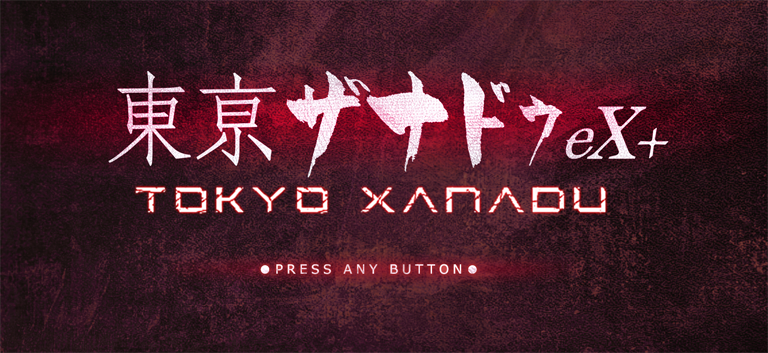
And while Tokyo Xanadu Ex+ is an RPG the way telling your cabbie where to pull over is a racing sim, its story is compelling and – frankly – nice enough to make up for its shortcomings as a game.
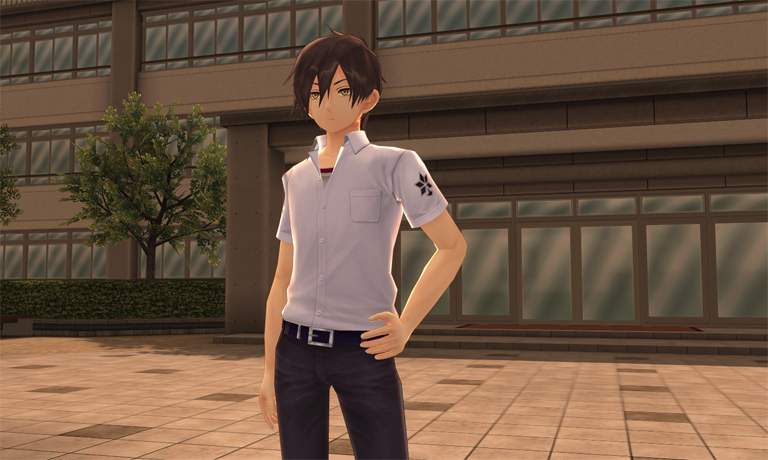
In Xanadu, you play a high-school (anime trope strike one!) boy (strike two!) Kou Tokisaka, who is handsome, hard-working, well-liked and surrounded by a tightly-knit core of friends ( three! four! five! six! ... you get the idea – the groundwork ain't all that original). Morimiya, the suburb of Tokyo your school is in, has only recently recovered from a massive earthquake that devastated the area 10 years ago. You attend school, work part-time evenings, and are on track for a mundane high school existence until you step in to help a classmate and things go a little sideways (as they tend to do in anime high school stories).
In very short order, you find out that your attractive but aloof classmate (and the tropes keep coming...), Asuka Hiiragi, is muscle for a secret organization; that Morimiya is a gateway, of sorts, into a parallel world called the Eclipse; that people's unaddressed gripes can form monsters called Greeds; and that (naturally) you are one of the few folks in town who can not only see this otherworldly weirdness, but also interact (read: fight) with it as well. You start out helping Asuka deal with small-time problems, like finding missing people, and things snowball from there, gradually attracting new people to your party and blowing Morimiya's Eclipse problem out of all proportion.
In the sense that RPGs have a role you can play, Xanadu falls short: there is no role that you define for yourself. You always play Kou Tokisaka, and Kou Tokisaka is a fully fleshed-out character that leaves no room for interpretation. You can dress him how you want and decide whether or not he helps somebody out, but – that's about it. I suppose you could make a case that, since you are playing as somebody who is not yourself, you are – in a way – playing a "role" of sorts, but then — every game could be considered an "RPG"...
Xanadu's gameplay breaks down into two sections: 1) a walking simulator, where you talk to people, complete fetch quests, and play mini-games and 2) a 3rd-person action platformer, where you defeat Greeds and level up.
Like any self-respecting anime, Xanadu is episodic: broken down into 10 chapters each of which has its own plot line but also follows an overarching narrative. In each chapter, you begin out in the real world for some exposition and then delve into the Eclipse to "solve" (read: pummel the snot out of) that chapter's problem.
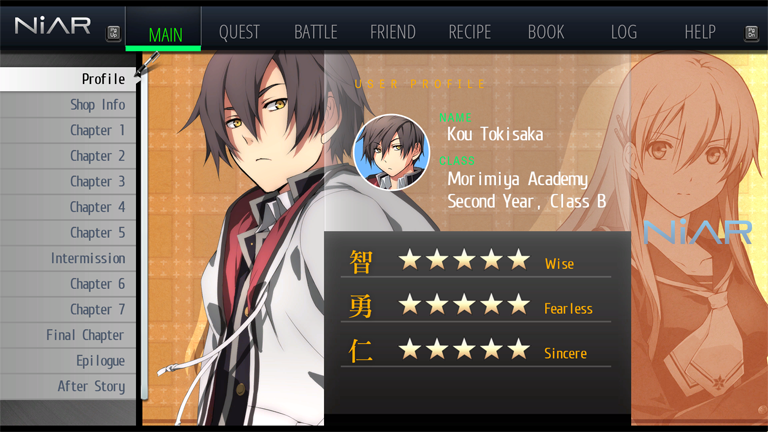
The walking simulator is fairly basic, with lead characters voiced by a talented cast for most lines and the rest supplied with endless word bubbles. As befits a high schooler in 2015, you have a cell phone (called NiAR) which acts as your hub for this section of the game. While walking, Kou has three statistics: Kindness, which you raise through completing quests; Wisdom, increased by reading books; and Virtue, which grows after successful Eclipse outings. None of the three really do anything and only act as milestones the completion of which is rewarded with an item (as far as you know). Other than that, you can find out "interesting" facts about people you meet (ranging from "meh" to — very), learn recipes and cook food, play mini-games in the town arcade, buy and sell items, change your outfits, buy things to put in your room (which sometimes leads to party-related events) and complete quests (of which there are only 40 in the entire game).
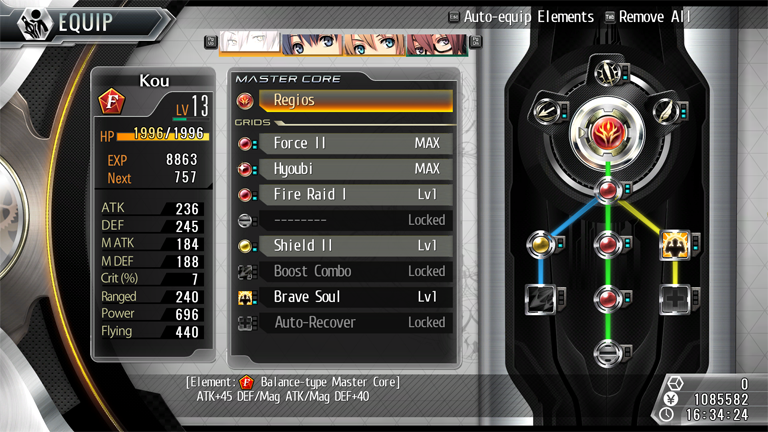
Once you enter the Eclipse, Kou's stats grow to eight – with hit points, experience, an average-complexity materia-like system (what can I say – I'm a traditionalist), dodges, jumps and four types of attacks (combo, power, flying, ranged). The action section of the game is functional without being deep, and the level design of the Eclipse mazes is decent. My only gripe here are the jumping sections: they don't creep up too often (thankfully – I hate 3rd person platforming), but do get annoying when they put in an appearance. Most mazes end in a boss fight and reward you with items you can use in the walking section to trade for more powerful elements (materia).
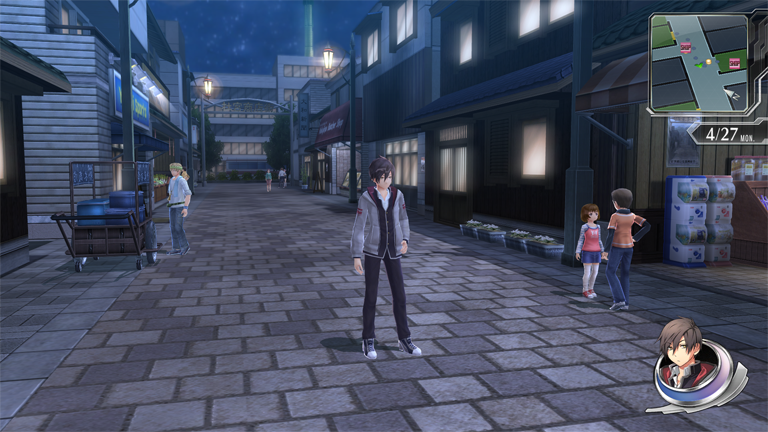
Both sections are expertly done, with pretty, anime-style, cel-shaded graphics, excellent animation, sparse but well done sound effects, and pleasant music you may find yourself humming out in the real world after sitting through a few hours' worth of loops. In terms of presentation, Xanadu has no real shortcomings (other than the usual "this place feels empty" vibe caused by console-port limitations).
One thing I will say about Nihon Falcom (the developers) — they never skimmed on details. Oh, there were a few bits outside of project scope where they clearly said "yeah, we don't have the budget for this scene" but – for everything else? – they delivered. My favorite example of this was one inconsequential quest where you cook food for the needy, in little community kitchens. A lesser dev would have had you finish the quest and moved right along to the next thing, but not Nihon Falcom — no, sir. Not only did they render the little kitchens, they gave each of the three little vignettes so you could see people lined up and your party members ready to dispense. And this instance was no outlier: the game is full of nice little touches like that — and all the better for it.
"Hold on" the more attentive of you (who speak out loud to themselves) may say at this point "How do you get a decent game out of a 'fairly basic walking simulator' and a 'functional, but shallow, action section'?" The answer, of course, is the story. As the premise I sketched earlier may suggest, nothing is as it seems in sleepy Morimiya and while some of the reveals you'll see coming, others may well sneak up on you in a most satisfying manner.
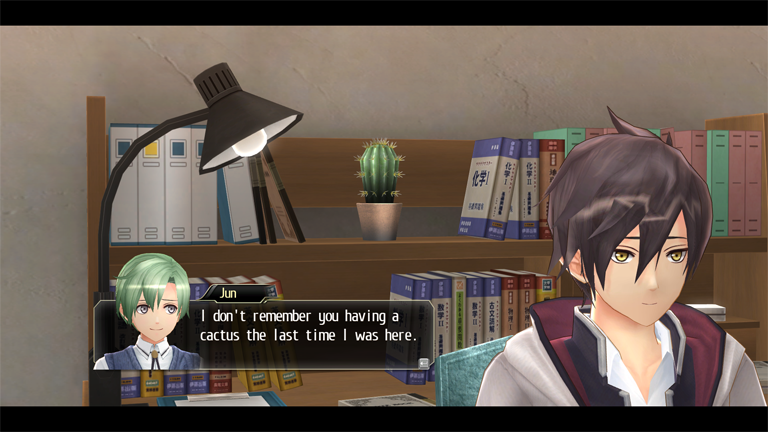
Which is not to say that Xanadu's plot isn't fairly formulaic, its writing a bit uneven, or its characters carbon-copies of stereotypes you've seen a hundred times before... But, put together, the whole experience works and kinda grows on you (I mean – if you let it). You may frown the first time you see the self-insert protagonist, hear someone shout an attack name, find out a character's parents are dead or missing (there's a lot of that around), or see a group of teens surpass competent professionals, but – as the chapters unfold and you get to know the characters better – you may well find yourself wondering how they will be affected by what happens; how they'll react; how they will grow... For my own part, I went into Xanadu in full "skeptical pig" mode (my default setting), rolling my piggy eyes at some parts, but – two hours in – still playing. Then four hours in. Then twenty.
I'm at 68 now, almost at the end of my first playthrough, and – still invested.
The core attraction of Tokyo Xanadu Ex+ is watching a well-constructed plot unfold, yes, but also seeing bit-part NPCs go through their own little dramas, seeing Morimiya evolve from one chapter to the next, or just having seasons change (for its age, the game has some of the best "rain drops on window" animation I've ever seen). The game also likes to throw you little unexpected treats, like collecting capsule toys, learning new semi-crafting mechanics or — competitive swimming.
Lastly, where the plot is concerned, it is genuinely refreshing (in the age of Chainsaw Man-like, "life is cruel – deal with it" narratives) to have a simple, feel-good story that ends well for all concerned. In Xanadu, good guys triumph, bad guys lose, people on the wrong path get course-correction and even the most drastic losses can be overturned. Which is not to say that I always eat pancakes drowning in syrup, but a little sweetness every now and again does the body good.
Tokyo Xanadu Ex+ may not be an RPG, in the strictest sense, but is a good game and a genuinely pleasant experience. If you ever get a taste for high school life in Japanese suburbia, monster-bashing, playing whack a mole at the arcade, or just spending quality time with a cast of decent characters, look up Kou in Morimiya and give him a hand. With everything that little town has in store for him, he's going to need it...
Pig Recommends:
-
Soul Eater, Soul Eater Not! (anime) – animated by Bones (so you know it's good) and alternately grave and hilarious, this series turns the high school trope on its spiky-haired head with a wild cast of characters, great world-building, and a real rollercoaster of a plot; and, best of all – at 51 episodes – it's substantial enough not to leave you hanging (though, just in case you are, Soul Eater Not! extends the fun with 12 more episodes in the same world, but with a different cast of characters);
-
ReLIFE (anime) – custom-made for anyone who ever wanted a do-over of their high-school experience (so, pretty much everyone), ReLIFE is funny, but also genuinely touching enough to make me tear up just reading the title; if you want a heartfelt story about second chances at life (and don't mind getting gut-punched along the way) give this one a try;
